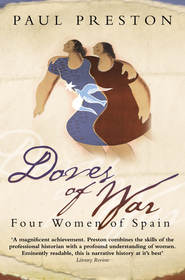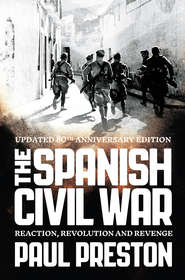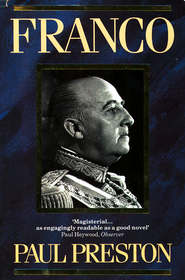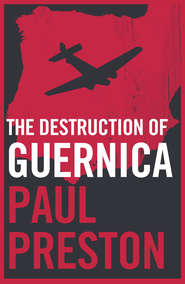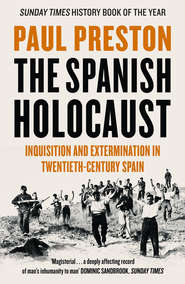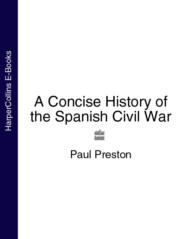По всем вопросам обращайтесь на: info@litportal.ru
(©) 2003-2024.
✖
Juan Carlos: Steering Spain from Dictatorship to Democracy
Настройки чтения
Размер шрифта
Высота строк
Поля
Juan Carlos: Steering Spain from Dictatorship to Democracy
Paul Preston
A powerful biography of Spain’s great king, Juan Carlos, by the pre-eminent writer on 20th-century Spanish history.There are two central mysteries in the life of Juan Carlos, one personal, the other political.The first is the apparent serenity with which he accepted that his father had surrendered him, to all intents and purposes, into the safekeeping of the Franco regime. In any normal family, this would have been considered a kind of cruelty or, at the very least, baleful negligence. But a royal family can never be normal, and the decision to send the young Juan Carlos away from Spain was governed by a certain ‘superior’ dynastic logic.The second mystery lies in how a prince raised in a family with the strictest authoritarian traditions, who was obliged to conform to the Francoist norms during his youth and educated to be a cornerstone of the plans for the reinforcement of the dictatorship, eventually sided so emphatically and courageously with democratic principles.Paul Preston – perhaps the greatest living commentator on modern Spain – has set out to address these mysteries, and in so doing has written the definitive biography of King Juan Carlos. He tackles the king’s turbulent relationship with his father, his cloistered education, his bravery in defending Spain’s infant democracy after Franco’s death and his immense hard work in consolidating parliamentary democracy in Spain. The resulting biography is both rigorous and riveting, its vibrant prose doing justice to its vibrant subject. It is a book fit for a king.
JUAN CARLOS
A People’s King
PAUL PRESTON
In Memory of José María Coll Comín
CONTENTS
Cover (#u89aeb982-7045-5ab7-ba38-7d7a0081f8da)
Title Page (#u2a68f1d3-0cf0-5536-a844-84fed95aa937)
CHAPTER ONE: (#uec37d760-fd80-52db-a4a0-1135a211e6ac)In Search of a Lost Crown 1931–1948
CHAPTER TWO: (#ud3f2009d-6c87-5d28-9259-cf7fb46cdb50)A Pawn Sacrificed 1949–1955
CHAPTER THREE: (#u27a2bb3a-5743-58ed-ace0-3039858ff7df)The Tribulations of a Young Soldier 1955–1960
CHAPTER FOUR: (#u6c560511-67b9-533b-8795-e025c1c974ef)A Life Under Surveillance 1960–1966
CHAPTER FIVE: (#litres_trial_promo)The Winning Post in Sight 1967–1969
CHAPTER SIX: (#litres_trial_promo)Under Suspicion 1969–1974
CHAPTER SEVEN: (#litres_trial_promo)Taking Over 1974–1976
CHAPTER EIGHT: (#litres_trial_promo)The Gamble 1976–1977
CHAPTER NINE: (#litres_trial_promo)More Responsibility, Less Power: the Crown and Golpismo 1977–1980
CHAPTER TEN: (#litres_trial_promo)Fighting for Democracy 1980–1981
CHAPTER ELEVEN: (#litres_trial_promo)Living in the Long Shadow of Success 1981–2002
BIBLIOGRAPHY (#litres_trial_promo)
NOTES (#litres_trial_promo)
INDEX (#litres_trial_promo)
ACKNOWLEDGEMENTS (#litres_trial_promo)
About the Author (#litres_trial_promo)
Praise (#litres_trial_promo)
Also by the Author (#litres_trial_promo)
Copyright (#litres_trial_promo)
About the Publisher (#litres_trial_promo)
CHAPTER ONE In Search of a Lost Crown 1931–1948 (#ulink_98d486ff-0456-5998-abc7-fd961d717d61)
There are two central mysteries in the life of Juan Carlos, one personal, the other political. The key to both lies in his own definition of his role: ‘For a politician, because he likes power, the job of King seems to be a vocation. For the son of a King, like me, it’s something altogether different. It’s not a question of whether I like it or not. I was born to it. Ever since I was a child, my teachers have taught me to do things that I didn’t like. In the house of the Borbóns, being King is a profession.’
(#litres_trial_promo) In those words lies the explanation for what is essentially a life of considerable sacrifice. How else is it possible to explain the apparent equanimity with which Juan Carlos accepted the fact that his father, Don Juan, to all intents and purposes sold him into slavery? In 1948, in order to keep the possibility of a Borbón restoration in Spain on Franco’s agenda, Don Juan permitted his son to be taken to Spain to be educated at the will of the Caudillo. In a normal family, this act would be considered to be one of cruelty, or at best, of callous irresponsibility. But the Borbón family was not ‘normal’ and the decision to send Juan Carlos away responded to a ‘higher’ dynastic logic. Nevertheless, the tension between the needs of the human being and the needs of the dynasty lies at the heart of the story of the distance between the fun-loving boy, Juanito de Borbón, and the rather stiff prince Juan Carlos with his perpetually sad look. The other, rather more difficult puzzle, is how a prince emanating from a family with considerable authoritarian traditions, obliged to function within ‘rules’ invented by General Franco, and brought up to be the keystone of a complex plan for the continuity of the dictatorship should have committed himself to democracy.
The mission to which Juan Carlos was born, and which would take precedence over any personal life, was to make good the disaster that had struck his family in 1931. On 12 April 1931, nationwide municipal elections had seen sweeping victories for the anti-monarchical coalition of Republicans and Socialists. King Alfonso XIII, an affable and irresponsible rake, had earned considerable unpopularity for his part in the great military disaster at Annual in Spain’s Moroccan colony in 1921. Even more, his collusion in the establishment of a military dictatorship in 1923 had sealed his fate. When he learned that his generals were not inclined to risk civil war in order to overturn the election results, he gave a note to his Prime Minister, Admiral Aznar. ‘The elections celebrated on Sunday show me clearly that today I do not have the love of my people. My conscience tells me that this wrong turn will not last forever, because I always tried to serve Spain, my every concern being the public interest even in the most difficult moments.’ He went on to say, ‘I do not renounce any of my rights.’ In that statement can be distantly discerned the process whereby Spain lost a monarchy, suffered a dictatorship and regained a monarchy. The hidden message to his supporters was that they should create a situation in which the Spanish people would beg him to return. This would be the seed from which the military uprising of 1936 would grow. However, its leader, General Franco, despite being a self-proclaimed monarchist and one-time favourite of Alfonso XIII, would not call him back to be King. One reason perhaps was that Alfonso XIII also said, ‘I am King of all Spaniards, and also a Spaniard.’ Those words would often be used by Alfonso’s son and heir, Don Juan, and would occasion the sarcastic mirth of the dictator. They would be used again on the day of the coronation of King Juan Carlos.
(#litres_trial_promo)
On 14 April 1931, on his painful journey from Madrid, via Cartagena, into exile in France, the King was accompanied by his cousin, Alfonso de Orleáns Borbón. The Queen, Victoria Eugenia of Battenburg, a granddaughter of Queen Victoria, was escorted into exile by her cousin, Princess Beatrice of Saxe-Coburg, the wife of Alfonso de Orleáns Borbón.
(#litres_trial_promo) The government of the Republic quickly published a decree depriving the exiled King of his Spanish citizenship and the royal family of its possessions in Spain. After a short sojourn in the Hôtel Meurice on the rue de Rivoli in Paris, the royal family moved to a house in Fontainebleau. There, Alfonso XIII received delegations of conspirators against the Second Republic and gave them his approval and encouragement.
(#litres_trial_promo)
In addition to the blow of exile, Alfonso XIII suffered considerable personal sadness. Without the scenery of the palace and the supporting cast of courtiers, the emptiness of his relationship with Victoria Eugenia was increasingly exposed. Not long after their arrival at Fontainebleau, the King remonstrated with the Queen about her closeness to the Duke and Duchess de Lécera who had accompanied her into exile. The marriage of the Duke, Jaime de Silva Mitjans, and the lesbian Duchess, Rosario Agrelo de Silva, was a sham but they stayed together because both were in love with the Queen. Despite persistent rumours, which niggled at Alfonso XIII, the Queen always vehemently denied that she and the Duke had been lovers. Nevertheless, when the bored Alfonso XIII took a new lover in Paris and the Queen in turn remonstrated with him, he tried to divert the onslaught by throwing in her face the alleged relationship with Lécera. She denied it but, as tempers rose, he demanded that she choose between himself and Lécera. Fearful of losing their support, on which she had come to rely, she replied, by her own account, with the fateful words, ‘I choose them and never want to see your ugly face again.’
(#litres_trial_promo) There would be no going back.
Another reason for Alfonso’s long-deteriorating relationship with Victoria Eugenia was the fact that she had brought haemophilia into the family. The couple’s eldest son, Alfonso, was of dangerously delicate health. He was haemophilic and, according to his sister, the Infanta Doña Cristina, ‘the slightest knock caused him terrible pain and would paralyse part of his body.’ He often could not walk unaided and lived in constant fear of a fatal blow. When the recently appointed Director General of Security, Emilio Mola, made his courtesy visit to the palace in February 1930, he was shocked: ‘I also visited the Príncipe de Asturias [the Spanish equivalent of the Prince of Wales] and only then did I fully understand the intimate tragedy of the royal family and comprehend the pain in the Queen’s face. He received me standing up and had the kindness to ask me to sit. Then he tried to get up to see me out and it was impossible: a flash, of anguish and of resignation, passed across his face.’
(#litres_trial_promo) Alfonso formally renounced his right to the throne on n June 1933 in return for his father’s permission to contract a morganatic marriage with an attractive but frivolous girl he had met at the Lausanne clinic where he was receiving treatment. Edelmira Sampedro y Robato was the 26-year-old daughter of a rich Cuban landowner.
Immediately following his eldest son’s renunciation of his dynastic rights, Alfonso XIII arranged for a number of prominent monarchists to put pressure on his second son, Don Jaime, to follow his brother’s example. Don Jaime was deaf and dumb – the result of a botched operation when he was four. Cut off from the world, both by dint of his royal status and his deafness, he had grown into a singularly immature young man. The monarchist leader José Calvo Sotelo persuaded him that his inability to use the telephone would significantly diminish his capacity to take part in anti-Republican conspiracies.
(#litres_trial_promo) Alfonso married Edelmira in Lausanne, in the presence of his mother and two sisters. Neither his father nor three brothers deigned to attend. On the same day, in Fontainebleau, 21 June 1933, Don Jaime, who was single at the time, finally agreed to renounce his rights to the throne, as well as those of his future heirs. The renunciation was irrevocable and would be ratified on 23 July 1945. In spite of this, he would later contest its validity, thereby complicating Juan Carlos’s rise to power.
(#litres_trial_promo)
In his 1933 letter to his father, Don Jaime wrote: ‘Sire. The decision of my brother to renounce, for himself and his descendants, his rights to the succession of the crown has led me to weigh the obligations that thus fall on me … I have decided on a formal and explicit renunciation, for me and for any descendants that I might have, of my rights to the throne of our fatherland.’
(#litres_trial_promo) Don Jaime would, in any case, have lost his rights when, in 1935, he also made a morganatic marriage, to an Italian, Emmanuela Dampierre Ruspoli, who although a minor aristocrat was not of royal blood. It was not a love match and would end unhappily.
(#litres_trial_promo)
In the summer of 1933, during a royal skiing holiday in Istria, Alfonso’s fourth son, Don Gonzalo – who also suffered from haemophilia – was involved in a car crash and died as a result of an internal haemorrhage.
(#litres_trial_promo) His first son fared little better. After his allowance was slashed by the exiled King, Alfonso’s marriage to Edelmira did not survive. They divorced in May 1937. Two months later, he married another Cuban, Marta Rocafort y Altuzarra, a beautiful model. The marriage lasted barely six months and they were also divorced, in January 1938. Having fallen in love with Mildred Gaydon, a cigarette girl in a Miami nightclub, Alfonso was on the point of marrying for a third time when tragedy once more struck the Borbón family. On the night of 6 September 1938, after leaving the club where Mildred worked, he too was involved in a car crash and, like his brother Gonzalo, died of internal bleeding.
(#litres_trial_promo)
Paul Preston
A powerful biography of Spain’s great king, Juan Carlos, by the pre-eminent writer on 20th-century Spanish history.There are two central mysteries in the life of Juan Carlos, one personal, the other political.The first is the apparent serenity with which he accepted that his father had surrendered him, to all intents and purposes, into the safekeeping of the Franco regime. In any normal family, this would have been considered a kind of cruelty or, at the very least, baleful negligence. But a royal family can never be normal, and the decision to send the young Juan Carlos away from Spain was governed by a certain ‘superior’ dynastic logic.The second mystery lies in how a prince raised in a family with the strictest authoritarian traditions, who was obliged to conform to the Francoist norms during his youth and educated to be a cornerstone of the plans for the reinforcement of the dictatorship, eventually sided so emphatically and courageously with democratic principles.Paul Preston – perhaps the greatest living commentator on modern Spain – has set out to address these mysteries, and in so doing has written the definitive biography of King Juan Carlos. He tackles the king’s turbulent relationship with his father, his cloistered education, his bravery in defending Spain’s infant democracy after Franco’s death and his immense hard work in consolidating parliamentary democracy in Spain. The resulting biography is both rigorous and riveting, its vibrant prose doing justice to its vibrant subject. It is a book fit for a king.
JUAN CARLOS
A People’s King
PAUL PRESTON
In Memory of José María Coll Comín
CONTENTS
Cover (#u89aeb982-7045-5ab7-ba38-7d7a0081f8da)
Title Page (#u2a68f1d3-0cf0-5536-a844-84fed95aa937)
CHAPTER ONE: (#uec37d760-fd80-52db-a4a0-1135a211e6ac)In Search of a Lost Crown 1931–1948
CHAPTER TWO: (#ud3f2009d-6c87-5d28-9259-cf7fb46cdb50)A Pawn Sacrificed 1949–1955
CHAPTER THREE: (#u27a2bb3a-5743-58ed-ace0-3039858ff7df)The Tribulations of a Young Soldier 1955–1960
CHAPTER FOUR: (#u6c560511-67b9-533b-8795-e025c1c974ef)A Life Under Surveillance 1960–1966
CHAPTER FIVE: (#litres_trial_promo)The Winning Post in Sight 1967–1969
CHAPTER SIX: (#litres_trial_promo)Under Suspicion 1969–1974
CHAPTER SEVEN: (#litres_trial_promo)Taking Over 1974–1976
CHAPTER EIGHT: (#litres_trial_promo)The Gamble 1976–1977
CHAPTER NINE: (#litres_trial_promo)More Responsibility, Less Power: the Crown and Golpismo 1977–1980
CHAPTER TEN: (#litres_trial_promo)Fighting for Democracy 1980–1981
CHAPTER ELEVEN: (#litres_trial_promo)Living in the Long Shadow of Success 1981–2002
BIBLIOGRAPHY (#litres_trial_promo)
NOTES (#litres_trial_promo)
INDEX (#litres_trial_promo)
ACKNOWLEDGEMENTS (#litres_trial_promo)
About the Author (#litres_trial_promo)
Praise (#litres_trial_promo)
Also by the Author (#litres_trial_promo)
Copyright (#litres_trial_promo)
About the Publisher (#litres_trial_promo)
CHAPTER ONE In Search of a Lost Crown 1931–1948 (#ulink_98d486ff-0456-5998-abc7-fd961d717d61)
There are two central mysteries in the life of Juan Carlos, one personal, the other political. The key to both lies in his own definition of his role: ‘For a politician, because he likes power, the job of King seems to be a vocation. For the son of a King, like me, it’s something altogether different. It’s not a question of whether I like it or not. I was born to it. Ever since I was a child, my teachers have taught me to do things that I didn’t like. In the house of the Borbóns, being King is a profession.’
(#litres_trial_promo) In those words lies the explanation for what is essentially a life of considerable sacrifice. How else is it possible to explain the apparent equanimity with which Juan Carlos accepted the fact that his father, Don Juan, to all intents and purposes sold him into slavery? In 1948, in order to keep the possibility of a Borbón restoration in Spain on Franco’s agenda, Don Juan permitted his son to be taken to Spain to be educated at the will of the Caudillo. In a normal family, this act would be considered to be one of cruelty, or at best, of callous irresponsibility. But the Borbón family was not ‘normal’ and the decision to send Juan Carlos away responded to a ‘higher’ dynastic logic. Nevertheless, the tension between the needs of the human being and the needs of the dynasty lies at the heart of the story of the distance between the fun-loving boy, Juanito de Borbón, and the rather stiff prince Juan Carlos with his perpetually sad look. The other, rather more difficult puzzle, is how a prince emanating from a family with considerable authoritarian traditions, obliged to function within ‘rules’ invented by General Franco, and brought up to be the keystone of a complex plan for the continuity of the dictatorship should have committed himself to democracy.
The mission to which Juan Carlos was born, and which would take precedence over any personal life, was to make good the disaster that had struck his family in 1931. On 12 April 1931, nationwide municipal elections had seen sweeping victories for the anti-monarchical coalition of Republicans and Socialists. King Alfonso XIII, an affable and irresponsible rake, had earned considerable unpopularity for his part in the great military disaster at Annual in Spain’s Moroccan colony in 1921. Even more, his collusion in the establishment of a military dictatorship in 1923 had sealed his fate. When he learned that his generals were not inclined to risk civil war in order to overturn the election results, he gave a note to his Prime Minister, Admiral Aznar. ‘The elections celebrated on Sunday show me clearly that today I do not have the love of my people. My conscience tells me that this wrong turn will not last forever, because I always tried to serve Spain, my every concern being the public interest even in the most difficult moments.’ He went on to say, ‘I do not renounce any of my rights.’ In that statement can be distantly discerned the process whereby Spain lost a monarchy, suffered a dictatorship and regained a monarchy. The hidden message to his supporters was that they should create a situation in which the Spanish people would beg him to return. This would be the seed from which the military uprising of 1936 would grow. However, its leader, General Franco, despite being a self-proclaimed monarchist and one-time favourite of Alfonso XIII, would not call him back to be King. One reason perhaps was that Alfonso XIII also said, ‘I am King of all Spaniards, and also a Spaniard.’ Those words would often be used by Alfonso’s son and heir, Don Juan, and would occasion the sarcastic mirth of the dictator. They would be used again on the day of the coronation of King Juan Carlos.
(#litres_trial_promo)
On 14 April 1931, on his painful journey from Madrid, via Cartagena, into exile in France, the King was accompanied by his cousin, Alfonso de Orleáns Borbón. The Queen, Victoria Eugenia of Battenburg, a granddaughter of Queen Victoria, was escorted into exile by her cousin, Princess Beatrice of Saxe-Coburg, the wife of Alfonso de Orleáns Borbón.
(#litres_trial_promo) The government of the Republic quickly published a decree depriving the exiled King of his Spanish citizenship and the royal family of its possessions in Spain. After a short sojourn in the Hôtel Meurice on the rue de Rivoli in Paris, the royal family moved to a house in Fontainebleau. There, Alfonso XIII received delegations of conspirators against the Second Republic and gave them his approval and encouragement.
(#litres_trial_promo)
In addition to the blow of exile, Alfonso XIII suffered considerable personal sadness. Without the scenery of the palace and the supporting cast of courtiers, the emptiness of his relationship with Victoria Eugenia was increasingly exposed. Not long after their arrival at Fontainebleau, the King remonstrated with the Queen about her closeness to the Duke and Duchess de Lécera who had accompanied her into exile. The marriage of the Duke, Jaime de Silva Mitjans, and the lesbian Duchess, Rosario Agrelo de Silva, was a sham but they stayed together because both were in love with the Queen. Despite persistent rumours, which niggled at Alfonso XIII, the Queen always vehemently denied that she and the Duke had been lovers. Nevertheless, when the bored Alfonso XIII took a new lover in Paris and the Queen in turn remonstrated with him, he tried to divert the onslaught by throwing in her face the alleged relationship with Lécera. She denied it but, as tempers rose, he demanded that she choose between himself and Lécera. Fearful of losing their support, on which she had come to rely, she replied, by her own account, with the fateful words, ‘I choose them and never want to see your ugly face again.’
(#litres_trial_promo) There would be no going back.
Another reason for Alfonso’s long-deteriorating relationship with Victoria Eugenia was the fact that she had brought haemophilia into the family. The couple’s eldest son, Alfonso, was of dangerously delicate health. He was haemophilic and, according to his sister, the Infanta Doña Cristina, ‘the slightest knock caused him terrible pain and would paralyse part of his body.’ He often could not walk unaided and lived in constant fear of a fatal blow. When the recently appointed Director General of Security, Emilio Mola, made his courtesy visit to the palace in February 1930, he was shocked: ‘I also visited the Príncipe de Asturias [the Spanish equivalent of the Prince of Wales] and only then did I fully understand the intimate tragedy of the royal family and comprehend the pain in the Queen’s face. He received me standing up and had the kindness to ask me to sit. Then he tried to get up to see me out and it was impossible: a flash, of anguish and of resignation, passed across his face.’
(#litres_trial_promo) Alfonso formally renounced his right to the throne on n June 1933 in return for his father’s permission to contract a morganatic marriage with an attractive but frivolous girl he had met at the Lausanne clinic where he was receiving treatment. Edelmira Sampedro y Robato was the 26-year-old daughter of a rich Cuban landowner.
Immediately following his eldest son’s renunciation of his dynastic rights, Alfonso XIII arranged for a number of prominent monarchists to put pressure on his second son, Don Jaime, to follow his brother’s example. Don Jaime was deaf and dumb – the result of a botched operation when he was four. Cut off from the world, both by dint of his royal status and his deafness, he had grown into a singularly immature young man. The monarchist leader José Calvo Sotelo persuaded him that his inability to use the telephone would significantly diminish his capacity to take part in anti-Republican conspiracies.
(#litres_trial_promo) Alfonso married Edelmira in Lausanne, in the presence of his mother and two sisters. Neither his father nor three brothers deigned to attend. On the same day, in Fontainebleau, 21 June 1933, Don Jaime, who was single at the time, finally agreed to renounce his rights to the throne, as well as those of his future heirs. The renunciation was irrevocable and would be ratified on 23 July 1945. In spite of this, he would later contest its validity, thereby complicating Juan Carlos’s rise to power.
(#litres_trial_promo)
In his 1933 letter to his father, Don Jaime wrote: ‘Sire. The decision of my brother to renounce, for himself and his descendants, his rights to the succession of the crown has led me to weigh the obligations that thus fall on me … I have decided on a formal and explicit renunciation, for me and for any descendants that I might have, of my rights to the throne of our fatherland.’
(#litres_trial_promo) Don Jaime would, in any case, have lost his rights when, in 1935, he also made a morganatic marriage, to an Italian, Emmanuela Dampierre Ruspoli, who although a minor aristocrat was not of royal blood. It was not a love match and would end unhappily.
(#litres_trial_promo)
In the summer of 1933, during a royal skiing holiday in Istria, Alfonso’s fourth son, Don Gonzalo – who also suffered from haemophilia – was involved in a car crash and died as a result of an internal haemorrhage.
(#litres_trial_promo) His first son fared little better. After his allowance was slashed by the exiled King, Alfonso’s marriage to Edelmira did not survive. They divorced in May 1937. Two months later, he married another Cuban, Marta Rocafort y Altuzarra, a beautiful model. The marriage lasted barely six months and they were also divorced, in January 1938. Having fallen in love with Mildred Gaydon, a cigarette girl in a Miami nightclub, Alfonso was on the point of marrying for a third time when tragedy once more struck the Borbón family. On the night of 6 September 1938, after leaving the club where Mildred worked, he too was involved in a car crash and, like his brother Gonzalo, died of internal bleeding.
(#litres_trial_promo)






